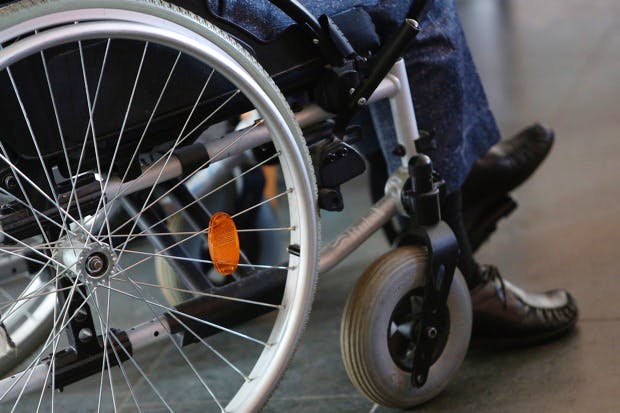I’m back in England after travelling from Italy by railway, because I have been forbidden to fly in case the altitude affects my wobbly brain. It was rather a complicated train journey, involving changes in Florence, Milan and Paris, but rather exciting. Florence looked wonderful, as did Paris, and, perhaps because of my brain damage, even Milan seemed rather beautiful. Only London appeared dull and drab on arrival. The other excitement was that I travelled as an invalid because of the brain haemorrhage suffered during my holiday in Tuscany. I can in fact walk perfectly well; but, thanks to the members of my family who had made meticulous preparations and accompanied me during the journey, I was met at every station by a man with a wheelchair and treated on every occasion with the greatest consideration. Even the French were exquisitely polite and attentive.
Being an invalid is rather addictive. Everyone is kind to you, everything is done for you, and you don’t have to make any plans for yourself. The problem is that you needn’t think and may forget how to do so. This, of course, suits very well those who are looking after you. It is much easier for carers to look after someone who doesn’t do any thinking but leaves it all to them. But it is strange for you to lose all control over your life, even to the extent of being kept in the dark about what’s going to happen to you next. You begin to wonder what the point of you is.
For a time, when I couldn’t even read (I’m glad to say that I can now), I would only think about what the next meal was going to be and would do nothing at all but watch television. During my two weeks in hospital in Siena, I didn’t even have control over what I saw on TV. I shared a room with a patient who had sole use of the remote control, and the only programmes ever shown were either motorbicycle races or (in English) Italia’s Got Talent. (Italians are, of course, a famously talented people, but you certainly wouldn’t realise so from this programme.)
Even so, I still watch more television now than I ever used to. British may be better than Italian television, but it’s still quite irritating. Versailles, which was the first programme I saw on getting home, was as absurd as everyone had warned it would be; but it was made all the more incomprehensible by the way that all the male characters, including Louis XIV, had the same lank, shoulder-length hair, which meant that I could never discover who was having sex with whom.
I like watching documentaries best, but even they can be very irritating. Most of them are still plagued by old clichés. A common one shows clouds racing at speed across the sky, even though everyone knows that clouds don’t do that: they usually move very slowly. But then directors believe that programmes must be boring unless they include lots of pointless visual gimmicks. Another annoying habit in documentaries is how presenters finish their pieces to camera. They turn around and head away, looking purposeful, as if they are going somewhere important; but we all know they aren’t really going anywhere at all and will stop and have a cigarette as soon as they are out of the camera’s sight.
I, of course, have arrived home at the height of the referendum campaign, and this has been depressing as well. But I was cheered up by a column in the Times by Daniel Finkelstein, for he made the point that has been constantly overlooked by others; and this is that the purpose of the European Union from its origins has been to prevent recurrence of war in this continent. War caused such incalculable misery and death during the 20th century that Finkelstein said he would vote Remain because doing otherwise would be a betrayal of his Jewish east European ancestors. One can see why, for his people have suffered worse than any. Years of peace have generated complacency, but another European war is no longer completely unimaginable. And if this is made less likely by supranational arrangements that curtail each nation’s sovereignty, this is surely a price worth paying.
Got something to add? Join the discussion and comment below.
Get 10 issues for just $10
Subscribe to The Spectator Australia today for the next 10 magazine issues, plus full online access, for just $10.













Comments
Don't miss out
Join the conversation with other Spectator Australia readers. Subscribe to leave a comment.
SUBSCRIBEAlready a subscriber? Log in